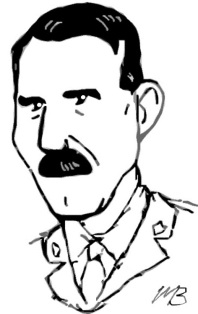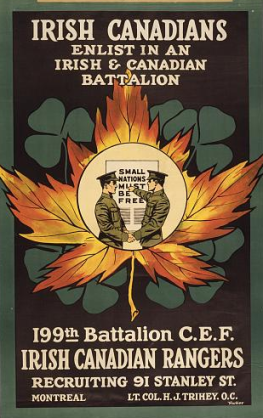Lieutenant Colonel Harry Trihey
199th (Duchess of Connaught’s Own Irish Rangers) Battalion
Moreover the confidence of those interested in the Regiment is absolutely in Colonel Trihey, Should his perhaps too hasty action result in his being deprived of its command and prevent his leading it to the front, the reward of the sacrifices he has made and is willing to continue to make, will be that he will be held up to the public as having deliberately deceived and misled these men.
(Doherty to Borden, 9 Feb 1917)
Henry Judah Trihey was an amateur hockey player for the Montreal Shamrocks between 1897 and 1901. Regarded as one of the best forwards of his time, Trihey won two Stanley Cups with the team and played a crucial role in defending the championship during three challenge games. He was born on 25 December 1877 in Berlin, Ontario. After his hockey career, he became a barrister in Montreal.
 As a famous Montreal athlete and celebrity in the city’s Irish Canadian community, in early 1916, Trihey offered to raise a battalion. Trihey conceived the Irish Canadian Rangers as uniting his own Roman Catholics with Irish Protestants. Under the motto “Quis Separabit” (“Who Shall Separate Us?), the 199th Battalion arrived in England just after Trihey’s thirty-ninth birthday, on 26 December 1916.
As a famous Montreal athlete and celebrity in the city’s Irish Canadian community, in early 1916, Trihey offered to raise a battalion. Trihey conceived the Irish Canadian Rangers as uniting his own Roman Catholics with Irish Protestants. Under the motto “Quis Separabit” (“Who Shall Separate Us?), the 199th Battalion arrived in England just after Trihey’s thirty-ninth birthday, on 26 December 1916.
Stunned by rumors that his unit was to be broken-up, Trihey charged the Canadian government with deception as the 199th had been promised to remain together. Irish hostility in the aftermath of the Easter Rising and British political maneuvering to exploit the Irish Canadians as propaganda tools further frustrated Trihey. Recognizing the irony of his slogan “Small nations must be free,” the disillusioned colonel and his second-in-command Major W. P. O’Brien resigned on 9 January 1917. J. V. P. O’Donahoe assumed command of the 199th and led the battalion on a planned tour of Ireland.
When it seemed as through the 199th would go to the front with the 5th Division, Minister of Justice Charles Doherty, the battalion’s patron, appealed to Prime Minister Borden for Trihey to be restored to command. Canadian High Commissioner George Perley strongly disagreed calling the resignation a “desertion” and pointed out that he “left without consulting or saying goodbye to his officers.”
Doherty persisted in lobbying Borden and complained that Perely, “looks at nothing but Trihey’s mistake tendering resignation and even puts upon that action harshest possible interpretation.” As Borden had sailed for England in March 1917, Doherty sent subsequent appeals in code, prompting the Prime Minister to respond “please code only important words as our staff is under great pressure.”
For his part, Trihey wrote a strongly worded letter to the New York Evening Post in which he criticized Ottawa’s manipulations and the British occupation of Ireland. Only the intervention of Doherty saved Trihey from charges of sedition.
His experience overseas seemed to diminish Trihey’s enthusiasm for the war effort. During the December 1917 federal election, he opposed the “vile and indefensible propaganda” of the Union Government and called on fellow Quebec Catholics to vote their conscious against conscription.
Trihey died on 9 December 1942 at the age of sixty-four. As a testament to his contributions and innovations to the game, he was inducted into the Hockey Hall of Fame in 1950.
RG 150, Accession 1992-93/166, Box 9785 – 18

Item on Trihey’s resignation, citing this good article as a partial source, as part of my present effort to track the events of 1916-17 for research:
http://lexanteinternet.blogspot.com/2017/01/englands-ireland-troubles-shakes-up.html